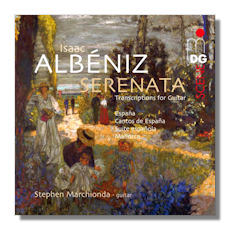
The Internet's Premier Classical Music Source
Related Links
- Albéniz Reviews
- Latest Reviews
- More Reviews
-
By Composer
-
Collections
DVD & Blu-ray
Books
Concert Reviews
Articles/Interviews
Software
Audio
Search Amazon
Recommended Links
Site News
 SACD Review
SACD Review
Isaac Albéniz

Piano Pieces Transcribed for Guitar
- Cantos de España "Prélude (Asturias-Leyenda)", Op. 232 #1
- Suite española Op. 47
- #1 Granada (Serenata)
- #3 Sevilla (Sevillanas)
- Cantos de España, Op. 232
- #4, Córdoba
- #2, Oriental
- Mallorca (Barcarola) Op. 202
- España, Op. 165
- Danse orientale "Zambra Granadina", Op. 181 #2
- Torre Bermeja (Serenata), Op. 92 #12
Stephen Marchionda, guitar
Dabringhaus & Grimm MDG9031739-6 67min Hybrid Multichannel SACD
Isaac Albéniz (1860-1909) was one of the most important Spanish composers of the second half of the 19th century. He spent his childhood in Barcelona and started learning the piano both there and in Madrid. At the age of 11 he was already embarking on concert tours around Spain, and later also concertized in Cuba and Puerto Rico. In 1876 he was granted a scholarship by the King and went to study in Brussels. At the end of this tenure, he decided to take up a concert career in his native country while also trying his hand at composition, writing three zarzuelas that represent his earliest stage-works. In 1883 Albéniz returned to Barcelona where he studied composition with Felipe Pedrell, one of Spain's foremost musicians of the time. Indeed, Pedrell's influence left a great mark on the young composer, and from 1886 onwards, practically all of Albéniz's piano compositions were characterized by Spanish folk melodies from several cities and regions. In the following years, the composer travelled to England and France where his concerts were warmly applauded. From 1893 onwards he resided permanently in Paris where he died in 1909, aged just 49. The pieces on this disc date from Albéniz's middle period (1886-1897), when his distinctive mature style was coming to the fore.
Though usually categorized as being of a salon nature, the nine works on this programme are not only charming and pleasant, but contain deep emotional expression mixed with an "españolismo' that is wholly Albéniz's. Structurally, these pieces are also a kind of a novelty, where the composer alternates rhythmically dynamic, dance-like sections with sections that are more reminiscent of a "copla' or song. Albéniz frequently performed the music of Scarlatti in his concerts. And like Scarlatti, he constantly imitated the sound of the guitar in his compositions.
But transcribing Albéniz to the guitar is not easy. Much care has to be taken to avoid the danger of actually lightening the music's intention and bringing it back towards the salon genre that he so successfully surpassed. For these transcriptions Stephen Marchionda worked with extant editions whenever possible in order to correct the discrepancies, changes of tempo, dynamics, harmony and rhythm of other editions. Also in order to remain as faithful as possible to the original conceptions, Marchionda made hardly any attempts to facilitate the execution on the guitar, and so Albéniz's harmonic language can be enjoyed as it was envisaged.
This is a truly splendid disc, where everything is in its proper place. Performances have a beguiling delicacy that brings out all the ravishing nuances of these works, and Marchionda's scholarly and virtuosic transcriptions resonate with technical skills and thoughtful expression. The soloist's detailed essay is also a fitting tribute to his thriving enthusiasm to raise this repertoire to a higher level of appreciation. Luscious presentation and smooth-sounding sonics complete another superb MD&G issue.
Copyright © 2012 by Gerald Fenech.





















